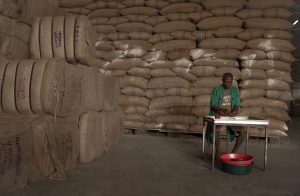CASHEW PREMIUM MARKETS: Traceability and Transparency
Increasingly, global consumers want to know about the origin of their food. Efficient, transparent supply chain management systems allow for the tracking of a product from harvest through transport, storage, processing, and commercialization. Information collected along the way helps to enhance supply-side management, mitigate risks to food safety, and facilitate a range of product certifications, including organic and fair trade.
Within the cashew industry, systems that allow for the clear, easy tracking of nuts from tree to trade are an important tool for providing consumers with information about where the nuts come from and how they are handled along their journey from farm to table. For these supply chain management systems to be strong and effective, they require organized producer associations, strategic factory procurement practices, proper warehouse organization and management, a commitment to batch processing, and strong market linkages.
Unlike cashew factories in India and Vietnam that import raw nuts from multiple countries for processing, the cashews processed in Mozambican factories have a single origin: Mozambique. In many cases, the nuts are processed by factories located in the same district where they are grown. The virtual lack of foreign cashew entering the supply chain and the short distances between production and processing locations makes Mozambique well-positioned to be a global industry leader in socially responsible sourcing and traceability.

Certifications
Strong traceability systems facilitate a range of certifications demanded by international premium food markets. Certifications also speak to the ethics of Mozambican cashew, including environmental sustainability, human rights, and social responsibility.
Food safety certifications, such as HACCP and BRC Food Safety, are a critical feature of Mozambican processors’ plan to expand their reach into new markets around the world. Adherence to these internationally accepted standards for food safety ensures that processing facilities are producing cashew kernel that is free from chemical adulteration and microbial contamination.
Organic certification is also well within the reach of some Mozambican cashew producers and processors. The prevailing farming practices of cashew producers lend themselves well to the standards of organic production, and even the most serious production problems have viable organic solutions that can be implemented without asking farmers to trade yields or economic efficiency for environmental sustainability. Certification of these best practices will facilitate the access of Mozambican cashew producers and processors to the growing niche markets for organic products in the European Union and United States.




